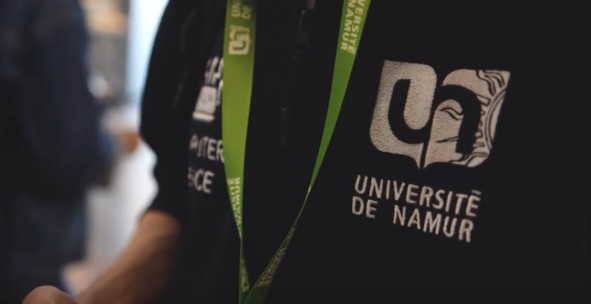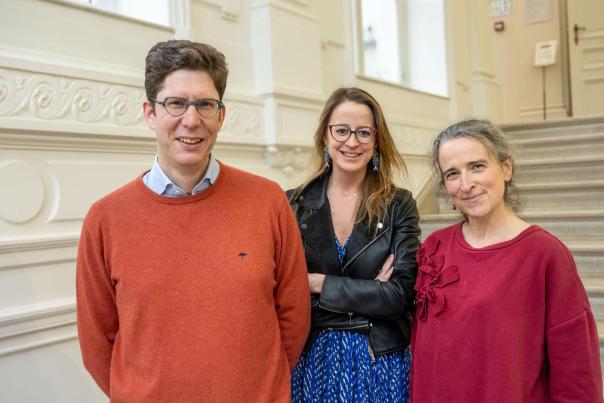The organization of the JEDDT is an institutional project that aims to educate 3rd-year bachelor students at the University of Namur about the multiple issues involved in the transition to sustainable development, in its social, environmental, economic, cultural and democratic dimensions.
A four-stage project
The JEDDT is the first cross-disciplinary training course dedicated to the challenges of sustainable development and transition launched by UNamur for all its final-year bachelor students.
The JEDDT aims to introduce students to prospective thinking in an interdisciplinary context. To this end, the program offers students a course of study.s a pedagogical path punctuated by four stages:
- Knowledge: acquire a common background (basic scientific knowledge and semantics) on the issues of sustainable development and transition;
- Think: develop open (trans- and interdisciplinary), plural (openness to other worldviews) and systemic (systems theory) critical thinking;
- Imagine: build a creative and reasoned approach to imagining desirable and sustainable alternative futures;
Act : define and plan actions opening up desirable and sustainable futures, in particular thanks to the Uni for Change
In each of the activities carried out, students work in multidisciplinary groups.
The JEDDTs adopt an original pedagogical approach. Faithful to Ignatian pedagogy and its "experience-reflection-action" paradigm, they are inspired by transformative education focused on the development of cognitive, socio-emotional and behavioral skills ("head-heart-hand" approach) popularized notably by Schumacher College in England.
JEDDT aftermovie - Closing evening 24-25 (March 17, 2025)

360-degree vision
In order to promote a holistic approach to the issue, students attend six lectures in the first term on the challenges of sustainable development and transition from the perspective of the different disciplines taught at UNamur. After each lecture, students are required to verify their knowledge through an iterative test.
- Sciences: Global Change and the Anthropocene
- Economics:History of Economic Thought and Environmental Economics
- Political and Management Sciences: Climate Governance and Corporate Sustainability Management
- Medicine: One Health, one health, human, animal and planetary
- Philosophy & Law: Philosophical anthropology, ecologies and environmental law
- Geology and Informatics: Informatics and sustainability issues
A multidisciplinary and collective experience
With these tools of understanding in hand, students develop their critical thinking skills during a series of seminars organized in the second term (systems thinking, interdisciplinary thinking, scientific engagement, etc.). Once they have acquired this new knowledge, students are introduced to foresight through a series of workshops designed to help them imagine desirable and sustainable futures. Finally, throughout the year, students are invited to take part in a series of activities organized on Campus (workshops, lectures, film-debates, deep time walks, escape games, activities at Haugimont, etc.) and relayed via the Campus application.) and relayed via the Uni for Change application. These activities engage students in the desirable future(s) they have imagined as part of the forward-looking workshops. With JEDDT, students are trained to think in order to act.
Share your project with the community
At the end of the experiment, the students will have the opportunity to present the fruit of the team's reflection to the public through a creative medium (poster, speech, podcast, etc.) in the presence of experts and representatives of civil society. Evaluation is continuous, taking into account the various deliverables expected at each stage of the process.
The project team
The project is a unifying one within UNamur. It is spearheaded by Professor Amélie Lachapelle, (Faculty of Law), Professor Grégoire Wieërs, and Caroline Canon (Faculty of Medicine). The project is also intended to be transformative and formative for the institution and the teachers involved.

Amélie Lachapelle, professor in the Faculty of Law, and Grégoire Wieërs, professor in the Faculty of Medicine, are both behind new courses in their faculties linked to transition and sustainable development (Droit & Transition; One Health : une seule santé). A dozen teachers from 7 different faculties are directly involved in the project, through lectures and pedagogical support. Caroline Canon (Faculty of Medicine) is in charge of the pedagogical coordination aspect of this project.
The 6-24 Fund of the King Baudouin Foundation
Initiated via an impulse budget project Campus Namur Durable, this project is supported by the 6-24 Fund managed by the King Baudouin Foundation. This fund, which focuses on sustainable development, was created by entrepreneurs Michel and Carole Dumont (Lebronze Alloys). Michel Dumont and Fabienne Bister, President of the 6-24 Fund, are both alumni of the UNamur Business School. On the strength of this support, the JEDDT project is looking for partners to continue the JEDDT adventure for years to come.
